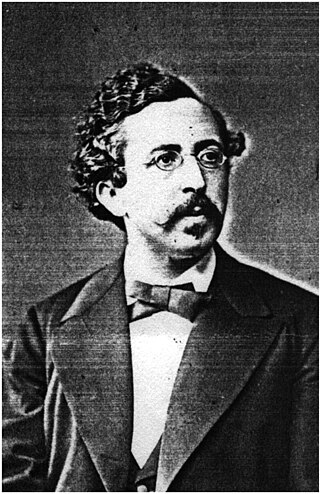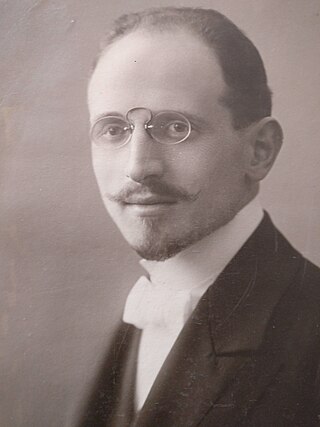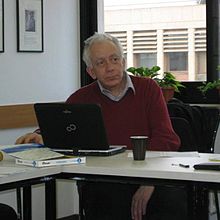
Leopold Zunz was the founder of academic Judaic Studies, the critical investigation of Jewish literature, hymnology and ritual. Zunz's historical investigations and contemporary writings had an important influence on contemporary Judaism.

Jewish philosophy includes all philosophy carried out by Jews, or in relation to the religion of Judaism. Until modern Haskalah and Jewish emancipation, Jewish philosophy was preoccupied with attempts to reconcile coherent new ideas into the tradition of Rabbinic Judaism, thus organizing emergent ideas that are not necessarily Jewish into a uniquely Jewish scholastic framework and world-view. With their acceptance into modern society, Jews with secular educations embraced or developed entirely new philosophies to meet the demands of the world in which they now found themselves.

Hermann Cohen was a German Jewish philosopher, one of the founders of the Marburg school of neo-Kantianism, and he is often held to be "probably the most important Jewish philosopher of the nineteenth century".
Richard Henry Popkin was an American academic philosopher who specialized in the history of enlightenment philosophy and early modern anti-dogmatism. His 1960 work The History of Scepticism from Erasmus to Descartes introduced one previously unrecognized influence on Western thought in the seventeenth century, the Pyrrhonian Scepticism of Sextus Empiricus. Popkin also was an internationally acclaimed scholar on Christian millenarianism and Jewish messianism.

Abraham Geiger was a German rabbi and scholar who is considered the founding father of Reform Judaism. Emphasizing Judaism's constant development through its history and universalist traits, Geiger sought to re-formulate received forms and design what he regarded as a religion compliant with modern times.
"Wissenschaft des Judentums" refers to a nineteenth-century movement premised on the critical investigation of Jewish literature and culture, including rabbinic literature, to analyze the origins of Jewish traditions.
Jakob Guttmann was a German-Jewish philosopher of religion (Religionsphilosoph) and rabbi. He officiated as chief rabbi of the Land rabbinate of Hildesheim between 1874 and 1892. Thereafter he served as rabbi in Breslau until his death.
Jewish skeptics are Jews who have held skeptical views on matters of the Jewish religion. In general, these skeptical views regard some or all of the "principles of faith," whatever these may be, but historically Jewish skepticism is directed either at (1) the existence of the God of Judaism or (2) the authenticity and veracity of the Torah.

In Judaism, God has been conceived in a variety of ways. Traditionally, Judaism holds that Yahweh, the god of Abraham, Isaac, and Jacob and the national god of the Israelites, delivered the Israelites from slavery in Egypt, and gave them the Law of Moses at Mount Sinai as described in the Torah. Jews traditionally believe in a monotheistic conception of God, characterized by both transcendence and immanence.

Aaron W. Hughes is a Canadian academic, author, and professor of religious studies. He holds the Dean's Professor of the Humanities and the Philip S. Bernstein Professor of Religious Studies in the Department of Religion and Classics at the University of Rochester. Previously, he was the Gordon and Gretchen Gross Professor at the University at Buffalo, State University of New York from 2009 to 2012, and, from 2001 to 2009, professor of religious studies at the University of Calgary in Alberta, Canada.
Ethical monotheism is a form of exclusive monotheism in which God is believed to be the only god as well as the source for one's standards of morality, guiding humanity through ethical principles.
Loren T. Stuckenbruck is a historian of early Christianity and Second Temple Judaism, currently professor of New Testament at the University of Munich, in Germany. His work has exerted a significant impact on the field.
Georges Nicolas Tamer holds the Chair of Oriental Philology and Islamic Studies at the Friedrich-Alexander-University Erlangen-Nuremberg. Until September 2012, he was professor of Arabic and Islamic studies and the holder of the M.S. Sofia Chair in Arabic Studies at the Ohio State University in Columbus, Ohio. A scholar of religion, philosophy, and Arabic and Islamic literature and culture, his fields of specialization include Qur'anic studies, Arabic philosophy, Christian- and Judeo-Arabic thought, and Islam in modernity. He has previously taught at the Freie Universität Berlin, the University of Erlangen-Nürnberg, and the Central European University.
Johann Maier was an Austrian scholar of Judaism, and was founder and, for thirty years, director of the Martin Buber Institute for Jewish Studies at the University of Cologne. He retired in 1996, and was living in Mittenwald, in Upper Bavaria.

Guy Gedalyah Stroumsa is an Israeli scholar of religion. He is Martin Buber Professor Emeritus of Comparative Religion at the Hebrew University of Jerusalem and Emeritus Professor of the Study of the Abrahamic Religions at the University of Oxford, where he is an Emeritus Fellow of Lady Margaret Hall. He is a Member of the Israel Academy of Sciences and Humanities.
Leopold Jakob Jehuda Treitel was a German Jewish classical scholar in the late 19th and early 20th century, and the last rabbi of the Jewish community in the town of Laupheim, then Württemberg, Southern Germany.

Arthur Löwenstamm was a Jewish theologian, writer and rabbi in Berlin and in London, where he came in 1939 as a refugee from Nazi Germany.
Matthias Henze is the Isla Carroll and Perry E. Turner Professor of Hebrew Bible and Early Judaism at Rice University in Houston, Texas.
Tessa Rajak is a British historian and Emeritus Professor of Ancient history at the University of Reading. She is also a Senior Associate of the Oxford Centre for Hebrew and Jewish Studies and Fellow of Somerville College, Oxford. Her research focuses primarily on Judaism in the Hellenistic and Roman periods, and she is an expert on the writings of Josephus.
Gerrit Bos is professor emeritus of Jewish studies.








